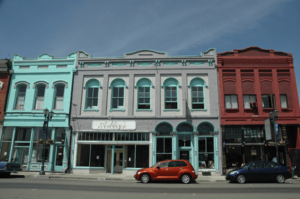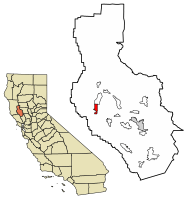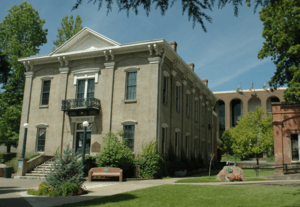Lakeport, California facts for kids
Quick facts for kids
Lakeport, California
|
|
|---|---|

Main Street
|
|

Location of Lakeport in Lake County, California
|
|
| Country | United States |
| State | California |
| County | Lake |
| Incorporated | April 30, 1888 |
| Government | |
| • Type | Council–manager government |
| Area | |
| • Total | 3.20 sq mi (8.28 km2) |
| • Land | 3.06 sq mi (7.92 km2) |
| • Water | 0.14 sq mi (0.36 km2) 46.53% |
| Elevation | 1,355 ft (413 m) |
| Population
(2020)
|
|
| • Total | 5,026 |
| • Density | 1,642.48/sq mi (634.17/km2) |
| Time zone | UTC-8 (Pacific (PST)) |
| • Summer (DST) | UTC-7 (PDT) |
| ZIP code |
95453
|
| Area code | 707 |
| FIPS code | 06-39710 |
| GNIS feature ID | 0277536 |
Lakeport is a city in California, United States. It is the main city, or county seat, of Lake County. Lakeport is about 125 miles (201 km) northwest of Sacramento.
The city is located on the western side of Clear Lake. It sits at an elevation of 1,355 feet (413 meters) above sea level. In 2020, about 5,026 people lived in Lakeport. This was a small increase from 4,753 people in 2010.
Contents
History of Lakeport
Lakeport has had several names over time. It was once called Forbestown, Rocky Point, Stony Point, and Tuckertown.
Early Settlers and Native Americans
Native Americans lived in the Lakeport area thousands of years ago. When new settlers arrived, the Kabe-napos people, a group of the Pomo people, lived there. Their main village was called Kaci-Badon. This name came from the water lily plant, Kaci, and badon, which meant island in their language.
First Businesses and Name Changes
The first business in Lakeport started in 1855. A man named Johnson traded goods with the Native Americans. He exchanged items for their crafts and baskets. The first actual shop was built by Dr. Boynton.
Later, William Forbes and James Parrish opened the first shop in the main Lakeport area. Parrish was a blacksmith, and Forbes made wagons. Forbes also helped with funerals. Because of his business and a gift of land to the county, the town was first named Forbestown.
William Forbes arrived in 1858. He bought 160 acres (0.65 km2) for his home and farm. When the county needed land for its main office, Forbes gave 40 acres (160,000 m2) of his property. The people thanked him by naming the town after him.
On June 14, 1861, Forbestown officially changed its name to Lakeport. Some places still use the Forbes name, like Forbes Creek and Forbes Street.
Important Events in Lakeport's Past
In 1850, Captain Nathaniel Lyon led an attack known as the Bloody Island Massacre. Lyon later fought and died for the Union in the Civil War.
The first post office opened in 1858, called Big Valley. It changed its name to Lakeport in 1861. The first Lakeport courthouse was built from wood in 1861. Sadly, it burned down in 1867 under strange circumstances.
In 1864, the Cache Creek Dam was built. Four years later, local people tore down the dam. They also destroyed the mills it powered. This happened after the dam caused floods in other areas.
In 1872, people reported seeing a creature called the "Monster of Blue Lakes" or "Devil Fish." This made Native Americans gather, expecting something big to happen.
In 1882, a famous outlaw named Black Bart robbed a stagecoach. It was traveling between Lakeport and Cloverdale. During this time, over 450 Chinese immigrants worked in the area's quicksilver mines.
In 1883, a man named William "Digger" Jones was legally executed in Lakeport. He was the only white man to be legally executed by the county.
In 1888, Lakeport officially became an incorporated city. For almost 100 years, it was the only incorporated city in Lake County. In 1892, Lakeport got its first telephone.
Geography and Environment
Lakeport is located at 39°02′35″N 122°54′57″W. The United States Census Bureau says the city covers about 3.2 square miles (8.3 km2). Most of this area, about 3.1 square miles (8.0 km2), is land. The rest, about 0.1 square miles (0.26 km2), is water.
Land and Soil
The Lakeport area sits in a valley filled with sediment next to Clear Lake. The ground here is mostly made of serpentinite and younger sediments. These sediments are a mix of sand, silt, clay, and gravel. They come from older rocks in the nearby mountains. Because these sediments are not very strong, they can easily erode (wear away) and cause small landslides.
Earthquakes and Faults
Many fault lines are found in Lake County. The largest number are in the Cobb Mountain area and near Hopland Grade. There are also active faults close to Lakeport. The famous San Andreas Fault is about 30 miles (48 km) to the west. The Healdsburg Fault is about 15 miles (24 km) to the west. These faults have caused moderate to large earthquakes in the past.
There is also a fault zone right east of Lakeport, along the shore of Clear Lake. This fault has been active in the last 2 million years. However, no major damaging earthquakes have happened in Lake County in the last 200 years. The Big Valley fault near Lakeport shows signs of recent movement in the ground.
The biggest earthquake to affect Lakeport was the 1906 San Francisco earthquake. It was a very strong earthquake. Even though the shaking was severe, Lakeport only had minor damage. Mostly, decorative parts of buildings and chimneys fell.
Lakeport gets most of its drinking water from wells. When there is a lot of rain, Clear Lake, Scotts Creek, and Forbes Creek can flood. This has caused property damage in the past.
Climate
Lakeport has a hot-summer Mediterranean climate. This means it has hot, mostly dry summers and cool, wet winters.
In January, the average high temperature is 53.4°F (11.9°C), and the average low is 31.5°F (-0.3°C). In July, the average high is 94.4°F (34.7°C), and the average low is 53.0°F (11.7°C).
On average, there are about 77 days each year when the temperature reaches 90°F (32°C) or higher. There are also about 75 days when the temperature drops to 32°F (0°C) or lower. The hottest temperature ever recorded was 112°F (44°C) in August 1971 and September 1972. The coldest was 9°F (-13°C) in December 1972.
The city gets about 28.36 inches (72.0 cm) of rain each year. It rains on about 66 days a year. The wettest year was 1973, with 44.50 inches (113.0 cm) of rain. The driest year was 2013. The most rain in one month was 19.62 inches (49.8 cm) in February 1986. The most rain in 24 hours was 5.43 inches (13.8 cm) in December 1937.
Snow is rare in Lakeport itself, but it is common in the mountains around the city. On average, Lakeport gets about 1.0 inch (2.5 cm) of snow each year. The most snow in one month was 15.0 inches (38.1 cm) in January 1937.
| Climate data for Lakeport | |||||||||||||
|---|---|---|---|---|---|---|---|---|---|---|---|---|---|
| Month | Jan | Feb | Mar | Apr | May | Jun | Jul | Aug | Sep | Oct | Nov | Dec | Year |
| Record high °C (°F) | 72 (22) |
79 (26) |
82 (28) |
91 (33) |
99 (37) |
106 (41) |
109 (43) |
106 (41) |
106 (41) |
95 (35) |
90 (32) |
77 (25) |
109 (43) |
| Mean daily maximum °C (°F) | 52 (11) |
55 (13) |
61 (16) |
68 (20) |
77 (25) |
82 (28) |
93 (34) |
91 (33) |
88 (31) |
75 (24) |
61 (16) |
54 (12) |
71 (22) |
| Daily mean °C (°F) | 41 (5) |
45 (7) |
46 (8) |
52 (11) |
59 (15) |
64 (18) |
72 (22) |
70 (21) |
66 (19) |
57 (14) |
48 (9) |
43 (6) |
55 (13) |
| Mean daily minimum °C (°F) | 30 (−1) |
34 (1) |
34 (1) |
37 (3) |
43 (6) |
46 (8) |
52 (11) |
50 (10) |
46 (8) |
41 (5) |
36 (2) |
34 (1) |
40 (5) |
| Record low °C (°F) | 14 (−10) |
21 (−6) |
25 (−4) |
28 (−2) |
30 (−1) |
30 (−1) |
34 (1) |
36 (2) |
— | 27 (−3) |
23 (−5) |
18 (−8) |
14 (−10) |
| Average precipitation mm (inches) | 5.9 (150) |
5.1 (130) |
3.5 (90) |
1.6 (40) |
0.8 (20) |
0 (0) |
0 (0) |
0 (0) |
0 (0) |
1.2 (30) |
2.8 (70) |
5.1 (130) |
26 (660) |
People and Population
| Historical population | |||
|---|---|---|---|
| Census | Pop. | %± | |
| 1880 | 562 | — | |
| 1890 | 991 | 76.3% | |
| 1900 | 726 | −26.7% | |
| 1910 | 870 | 19.8% | |
| 1920 | 1,024 | 17.7% | |
| 1930 | 1,318 | 28.7% | |
| 1940 | 1,490 | 13.1% | |
| 1950 | 1,983 | 33.1% | |
| 1960 | 2,303 | 16.1% | |
| 1970 | 3,005 | 30.5% | |
| 1980 | 3,675 | 22.3% | |
| 1990 | 4,390 | 19.5% | |
| 2000 | 4,820 | 9.8% | |
| 2010 | 4,753 | −1.4% | |
| 2020 | 5,026 | 5.7% | |
| U.S. Decennial Census | |||
Lakeport's population has grown steadily over the years. In 1880, there were 562 people. By 2020, the population had reached 5,026.
Population in 2010
In 2010, Lakeport had 4,753 residents. This meant there were about 1,486 people per square mile (573.8/km2).
Most of the people, about 82.7%, were White. About 3.1% were Native American, and 2.1% were Asian. People of Hispanic or Latino background made up 16.8% of the population.
Most people (97.1%) lived in regular homes. About 2.7% lived in places like nursing homes. There were 2,002 households in the city. About 28.1% of these households had children under 18. The average household had 2.31 people.
The median age in Lakeport was 44.2 years. This means half the people were younger than 44.2, and half were older. About 21.7% of the population was under 18 years old. About 20.1% were 65 or older.
Population in 2000
In 2000, Lakeport had 4,820 people living in 1,967 households. The average household size was 2.36 people.
The racial makeup was similar to 2010. About 88.7% of residents were White. Hispanic or Latino people made up 11.5% of the population.
The median income for a household was $32,226. For families, the median income was $37,900. About 15.7% of the population lived below the poverty line. This included 20.9% of those under 18.
See also
 In Spanish: Lakeport (California) para niños
In Spanish: Lakeport (California) para niños
 | Tommie Smith |
 | Simone Manuel |
 | Shani Davis |
 | Simone Biles |
 | Alice Coachman |


